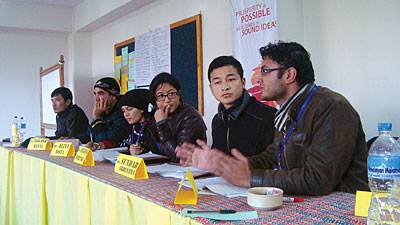 |
On the trekking trails and in the small towns in Nepal, if you talk to young people about what they think of the market as a concept, there is only one word that sums up their feeling: bad.
And they have good reason to feel that way. They see middlemen making more money than, say, hardworking small-scale milk producers. They see traders jacking up prices and paying only a fraction to farmers who spend months growing the vegetables. They see transport cartels shutting down highways to stamp out any hint of competition. The list goes on.
If the market as a concept is bad, what then is the solution? Almost all young people respond that the government must do something �anything to keep a leash on middlemen, traders, cartels and the like.
But when you ask them to list the achievements of the government in which they invest their hopes, they are stumped. Beyond pointing to the highway, assuming that one exists near their village, most have a hard time coming up with just what the government, both national and local, has delivered. Confronted with this, many young people then have doubts about the wisdom of the government reining in the market. But they are unable to articulate why.
To help such young people understand the role of an open competitive market in a democratic society, the organisation Samriddhi: The Prosperity Foundation has been running six-day residential Arthalaya camps since January 2009. This January, Samriddhi completed its eleventh camp and turned out its 264th graduate.
The way Arthalaya works is like this: young college students, drawn from both inside and outside of Kathmandu, are selected from among hundreds of applicants. Twenty-four students attend debates and discussions led by entrepreneurs, policymakers and free-market thinkers on topics such as economic freedom, voluntary exchange, rule of law, morality of markets, enterprise building and economic policymaking. (Disclosure: the author is one of the lecturers).
Outside of classes, the participants are divided into groups of make-believe entrepreneurs, government officers, and the public. Over six days, each group plays its role: the entrepreneurs try to produce and sell goods to customers by competing with one another on price, quality and service; government officers come up with tax rates, policies and (arbitrary) regulations that the entrepreneurs may not like; and some vocal members of the public call for bandas, making life difficult for both entrepreneurs and the government.
By the end of the camp, what the participants get is a vivid feel for how market actors and the government interact, disagree, compete or even collude in the real world. They often emerge with a new appreciation for the market, where open and free competition is more likely to ensure lower prices and higher quality.
The participants come away with new respect for the rule of law as a system that ensures that the same set of laws is equally applicable to all. They also learn that bandas and cartels impose real costs on people struggling to make a living.
Thus challenged to think differently, young people in Nepal start looking at the world with a lot more subtlety and skepticism. For far too long, they've been exposed to narrow, ideological thinking. If only there were a way to scale up Arthalaya's reach, Nepal's economy might finally be allowed to prosper.
READ ALSO:
Online incline, PAAVAN MATHEMA



